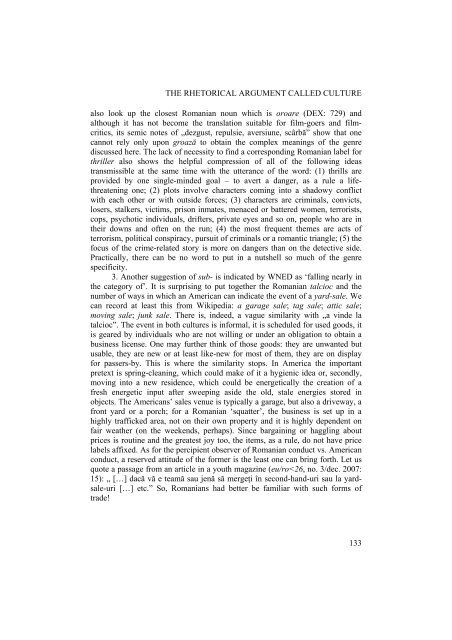culture, subculture and counterculture - Facultatea de Litere
culture, subculture and counterculture - Facultatea de Litere
culture, subculture and counterculture - Facultatea de Litere
Create successful ePaper yourself
Turn your PDF publications into a flip-book with our unique Google optimized e-Paper software.
THE RHETORICAL ARGUMENT CALLED CULTURE<br />
also look up the closest Romanian noun which is oroare (DEX: 729) <strong>and</strong><br />
although it has not become the translation suitable for film-goers <strong>and</strong> filmcritics,<br />
its semic notes of „<strong>de</strong>zgust, repulsie, aversiune, scârbă” show that one<br />
cannot rely only upon groază to obtain the complex meanings of the genre<br />
discussed here. The lack of necessity to find a corresponding Romanian label for<br />
thriller also shows the helpful compression of all of the following i<strong>de</strong>as<br />
transmissible at the same time with the utterance of the word: (1) thrills are<br />
provi<strong>de</strong>d by one single-min<strong>de</strong>d goal – to avert a danger, as a rule a lifethreatening<br />
one; (2) plots involve characters coming into a shadowy conflict<br />
with each other or with outsi<strong>de</strong> forces; (3) characters are criminals, convicts,<br />
losers, stalkers, victims, prison inmates, menaced or battered women, terrorists,<br />
cops, psychotic individuals, drifters, private eyes <strong>and</strong> so on, people who are in<br />
their downs <strong>and</strong> often on the run; (4) the most frequent themes are acts of<br />
terrorism, political conspiracy, pursuit of criminals or a romantic triangle; (5) the<br />
focus of the crime-related story is more on dangers than on the <strong>de</strong>tective si<strong>de</strong>.<br />
Practically, there can be no word to put in a nutshell so much of the genre<br />
specificity.<br />
3. Another suggestion of sub- is indicated by WNED as ‘falling nearly in<br />
the category of’. It is surprising to put together the Romanian talcioc <strong>and</strong> the<br />
number of ways in which an American can indicate the event of a yard-sale. We<br />
can record at least this from Wikipedia: a garage sale; tag sale; attic sale;<br />
moving sale; junk sale. There is, in<strong>de</strong>ed, a vague similarity with „a vin<strong>de</strong> la<br />
talcioc”. The event in both <strong>culture</strong>s is informal, it is scheduled for used goods, it<br />
is geared by individuals who are not willing or un<strong>de</strong>r an obligation to obtain a<br />
business license. One may further think of those goods: they are unwanted but<br />
usable, they are new or at least like-new for most of them, they are on display<br />
for passers-by. This is where the similarity stops. In America the important<br />
pretext is spring-cleaning, which could make of it a hygienic i<strong>de</strong>a or, secondly,<br />
moving into a new resi<strong>de</strong>nce, which could be energetically the creation of a<br />
fresh energetic input after sweeping asi<strong>de</strong> the old, stale energies stored in<br />
objects. The Americans’ sales venue is typically a garage, but also a driveway, a<br />
front yard or a porch; for a Romanian ‘squatter’, the business is set up in a<br />
highly trafficked area, not on their own property <strong>and</strong> it is highly <strong>de</strong>pen<strong>de</strong>nt on<br />
fair weather (on the weekends, perhaps). Since bargaining or haggling about<br />
prices is routine <strong>and</strong> the greatest joy too, the items, as a rule, do not have price<br />
labels affixed. As for the percipient observer of Romanian conduct vs. American<br />
conduct, a reserved attitu<strong>de</strong> of the former is the least one can bring forth. Let us<br />
quote a passage from an article in a youth magazine (eu/ro












